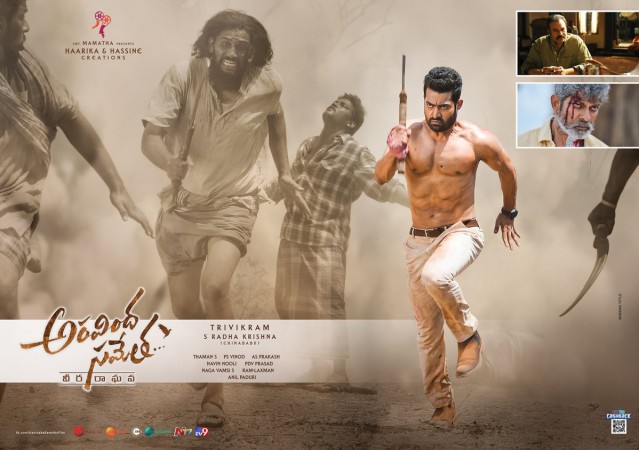While writing this review of
director Trvikram Srinivas’s latest outing ‘Aravinda Sametha Veera Raghava’
(ASVR), I chanced upon his Wikipedia page. The introduction says, “Regarded as the "wizard of words"
Trivikram's craft is known for its high dose of comedy, fast-paced repartee,
farcical situations, escapist themes, and comedy thriller plot lines involving
action, emotion, courtship, family and marriage.” Except for the farcical
situations, he lets down his audiences on every other aspect.

Set against the backdrop of two
warring villages in Rayalaseema, ASVR is the story of Veera Raghava Reddy (played
by Junior NTR) spearheading his clans fight against Basi Reddy (played by
Jagapathi Babu). They call this ‘Aidu
rupayala godava’ (5 rupees fight) and hand it over to their progeny, who
find it easier to stick swords into each other than solve this dispute for
once. But Veera Raghava Reddy, moved by his grandmother’s (played by Supriya
Pathak) rants, decides to take on his opponents with non-violence. Now, this is
a novel idea, where unlike the usual mass entertainers, the male protagonist is
not shown as the macho and masculine savior. A comical version of this theme
was seen in S.S Rajamouli’s Marayada
Ramanna, where the protagonist does not fight against a bunch of goons. Trivikram uses his trademark dialogues with
rhyme and rhythm, to act as a weapon that Veera Raghava uses to win over his
opponents, apart from the generous use of daggers and swords. To trigger his
change and affect his conscience, a haughty, arrogant and bubbly Aravinda
(played by Pooja Hegde) enters the scene. She casually drops her pearls of
wisdom, which Veera Raghava picks up to pave his plan of action ahead. Again,
instead of just being the arm-candy or add glamor, this role had a great
potential. More recently, Anushka Sharma played a similar support and trigger to
the male lead, as Mamta in ‘Sui Dhaaga’.
But, again, the writing lets down the character of Aravinda. Despite being the
titular role, Aravinda is reduced to just being a caricature, with no weight.

It would be a sin to look for
logic in a mass entertainer and we Telugu audiences love them for the lack of
it. But, Matala Mantrikudu Trivikram
overburdens his audiences with heavy dialogues, filled with puns, alliteration
and rhyme. There is a scene where the lead characters converse at a café and I
cannot imagine any normal couple conversing in the language that they use. Like
in his previous dud, Agnyathavasi, Trivikram
overdoes the same trademark dialogues to the extent that it becomes a painful
bore! The mood of the movie is set in a very gritty and serious space like
Trivikram’s blockbuster ‘Athadu’ or the
more recent action drama ‘Rangasthalam’.
But, ASVR is not engaging or gripping like either of them. The lack of depth in
the characters, along with the over-bearing dialogues, clubbed with a run time
of 2 hours and 45 minutes, seem like an extremely tiresome experience.
The only saving grace here are
the performances. Almost every actor cast in the main and supporting roles,
gets the Rayalaseema accent on point. While most of the supporting actors are
decent in their roles, a praise-worthy performance comes from Jagapathi Babu,
as the main antagonist. Playing a rugged and rustic version of his character
from Rangasthalam, Jagapathi Babu
uses his menacing eyes and evil face to create a gruesome villain and delivers
well. Pooja Hegde, apart from looking pretty and complimenting Junior NTR well,
gets some cute moments amid choppy dialogue delivery. Sunil, making a comeback as
the sidekick, is utterly wasted, as he neither gets to do comedy nor drama. But,
it is Junior NTR, who plays Veera Raghava with such conviction, that you try to
remain invested in this otherwise insipid tale. Being able to pull off a mass
character with élan is no mean feat, and he is charismatic at that. Using a
calm and restrained demeanor, reminiscent of Mahesh Babu from Athadu, his hard-work and efforts are
clearly visible in his performance. Unfortunately, he is let down by poor
writing, screenplay and dialogues.
From ‘Nuvve Kavali’ to as recently as ‘A Aa’, Trivikram has always been known for his brilliant dialogues,
with some of the finest gems in movies like ‘Nuvvu Naaku Nachavu’, ‘Manmadhudu’ and ‘Jalsa’. Watching ASVR
reminded me of Srinu Vaitla’s ‘Aagadu’
– another director known for his witty one-liners, who bored his audiences to
death with an overdose of bland dialogues. Not sure if it is Trivikram’s complacency
or lack of vision, but ASVR looked like a tale from a tired and disinterested
story-teller. Trust me, I seem as disinterested in writing this review as he
seemed to be while making this movie.
My Rating – 2/5
No comments:
Post a Comment
Note: Only a member of this blog may post a comment.